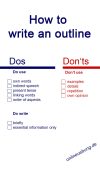Writing an outline
Writing an outline means writing a summary that is focused on the key facts. In German, we say: eine Inhaltsangabe schreiben.

Definition ‚Outline’
An outline is a brief summary of a given text, focussing on
-
- the most important information
-
- in a logical order.
It contains the main aspects or ideas of a text, that are needed to point on, what are you trying to prove.
An outline describes something, without detail. Just in general. Just the main idea and the important supporting fact.
Structure of an outline – general
Thesis: statement, which you are going to prove
-
- main idea / topic sentence / evidence to prove your thesis
-
- important supporting fact
-
- important supporting fact
-
- main idea / topic sentence / evidence to prove your thesis
-
- main idea / topic sentence / evidence to prove your thesis
-
- important supporting fact
-
- important supporting fact
-
- main idea / topic sentence / evidence to prove your thesis
Checkliste for Writing an outline
Dos and don’ts, when writing an outline zum kostenlosen downloaden.
Wichtig: Dos and don’ts
-
- Dos
-
- own words (eigene Worte)
-
- Indirect speech (Indirekte Rede)
-
- present tense – (Präsens)
-
- write briefly (knapp schreiben)
-
- essential information only (nur das Wichtigste)
-
- chronological or logical order of aspects (chronologische oder logische Reihenfolge der Aspekte)
-
- linking words (Bindewörter)
-
- Dos
-
- Don’ts
-
- No examples (keine Beispiele)
-
- No Details (keine Details)
-
- No repetition (keine Wiederholungen)
-
- No own opinion (keine eigene Meinung)
-
- Don’ts
Structure – with phrases as example –
Introduction (Einleitung)
-
- Text type (Textsorte)
-
- In the extract / article / paragraph / novel / story / excerpt / report, …
-
- Text type (Textsorte)
-
- Titel
-
- „……..“
-
- Titel
-
- Author
-
- written by „….“
-
- Author
-
- Topic or thesis (Thema oder Hypothese)
-
- is about …. .
-
- It deals with ….
-
- It describes …
-
- Topic or thesis (Thema oder Hypothese)
-
- Aspects (Aspekte)
-
- I want to sum up the information on … from the text.
-
- In the following I want to outline ….
-
- Here I am going to give an account to the aspect of …
-
- In the following
-
- I want to sum up the information
-
- The author writes about … / describes … /suggests …/ criticizes …
-
- Aspects (Aspekte)
Main part / body (Hauptteil)
In the main part of the outline only important, relevant and needed information to prove your thesis in the introduction are mentioned.
-
- In chronological order (chronologisch sortiert)
-
- First … / Then … / Next …
-
- Afterwords …
-
- During… / While …
-
- The day before / The night before / …
-
- In the end …
-
- The text ends with …
-
- Finally…
-
- In chronological order (chronologisch sortiert)
-
- In logical order (logisch sortiert)
-
- To start with
-
- In the beginning
-
- Secondly
-
- Besides
-
- Furthermore
-
- Moreover
-
- Apart from that
-
- In addition
-
- In logical order (logisch sortiert)
End (Schluss)
Reflection of what has been said before. Brief mentioning of the topic sentence and restatement of the thesis.
Maybe a conclusion – if requested by your teacher / customer.
Example phrases:
-
- To sum up …
-
- Having said all that …
-
- Taking these in concern …
-
- Putting all these together …
-
- Considering all of these aspects …
-
- As a conclusion …
-
- At last, it / the author / the writer / …. concludes that
-
- Summing up all this …
Übung – Writing an outline
Weiterführende Materialien
- Take Off Your Pants!: Outline Your Books for Faster, Better Writing: Revised Edition*
*Sponsored Link.

